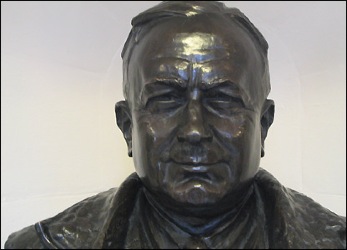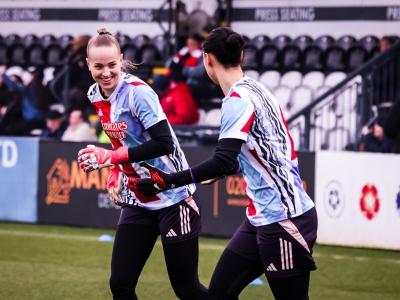After once again recording record profits Arsenal’s self sustaining model seems to be succeeding on the balance sheet, even if success on the playing field has for the past 5 years remained elusive. This week however Arsene’s austerity XI will line up against Roman’s roubles, who themselves last week lined up against and fell foul of the Petro-dollars of the middle Eastlands. However the mobilisation of huge financial resources to bring success has a long precedence within British football. Also like all great empires, they never seem to achieve their desired goal to rule for a thousand years.
While it’s tempting for Arsenal fans to get sanctimoniously carried away with criticising teams who in recent years have bought their success, history proves that the birth of Arsenal as a dominant trophy winning outfit was born more from the chequebook than anything resembling the Wengerite fiscal policy of moderate spending. Throughout the 1920s Herbert Chapman’s predecessor Leslie Knighton had originally been forbidden from spending over £1000 for any player, at a time when the British transfer record had been five times this amount. Sir Henry Norris in advertising for the position of Knighton’s successor had stated that ‘Those who pay exorbitant fees in transfers need not apply’. However after Chapman’s arrival Norris clearly became persuaded more toward the inclination to flex Arsenal’s financial muscle.
Charlie Buchan, at the time frequently described as the best player in the country and Sunderland‘s all time highest goal scorer, signed for Arsenal in 1925. In 1928 Arsenal broke the British transfer record by bringing David Jack in from Bolton for a fee in excess of £10,000. At the 1923 Cup Final he became Wembley’s first ever goalscorer. In 1929 Arsenal added the star performer of Scotland’s 5-1 humiliation of England on home turf the previous year - Preston North End’s Alex James. Other big signings that followed included a considerable sum for a 17 year old Cliff Bastin and Ted Drake as well as later smashing the transfer record again in 1938 - £15,000 for Bryn Jones from Wolves.
As the ‘Bank of England’ club in the late 20s and 1930s, Arsenal built their own ’galacticos’ style transfer policy, which paid for itself in gate receipts for crowds in excess of 70,000.
Arsenal’s extravagance however had been kept in check by the maximum wage and ‘retain and transfer’ rules, both of which were in place to deliberately prevent the richer clubs hoarding the talent. As possibly the world’s richest and most successful club by the end of the 30s, Stanley Matthews once stated that ‘as every performer dreams of playing the West End, every footballer dreams of playing for the Arsenal’. The great Sir Stanley turning out for the Arsenal may have happened under free market conditions, in reality though he only ever guested for Arsenal during wartime matches and notably the famous Moscow Dynamo match of 1945 which notoriously inspired George Orwell to describe sport in general as ‘war minus the shooting’.
Actual war with the shooting was to prove more costly to Arsenal though, due to 7 years without gate receipts and a bomb damaged stadium. The costs incurred as a result brought the end of Arsenal’s financial dominance over the English game, and nothing of comparison was seen again until the 1960s. The PFA under Jimmy Hill had removed the archaic restrictions on football’s employment market, at the same time as Littlewoods Pools founder Sir John Moores took over at Everton earning them the tag of the ’Mersey Millionaires’ as a result. Bill Shankly had once retorted that Everton ‘may well be the millionaires, but Liverpool are the people’s club’. In comparison Everton got very little in return for their millions, league titles in 1963 and 1970 and a cup win in 1966 were small fry to the dynasty Shanks had built up by the time of his retirement in 1974 as Liverpool went on to dominate world football for the next two decades.
Another side from the North West overshadowed by Liverpool’s 70s and 80s domination were Manchester United. It may seem unfathomable over three decades on, but United ended the 70s with only one trophy to their name, stopping Liverpool’s treble in a FA Cup win in 1977. Despite this, United’s gate receipts exceeded all others and as a result were still able to entice England international regulars like Ray Wilkins to Old Trafford, as well as players from clubs who in comparison finished the 70s with more silverware. Double European Cup winner Gary Birtles defected to United from Clough’s Forest in 1980 and twelve months on triple cup finalist and goal scorer in the 1979 win against United, Frank Stapleton, became Ron Atkinson’s first signing. Atkinson convinced the United board to spend big, parting with £3 million in his first season including the then British record of £1.5 million for Bryan Robson.
After four years in charge his successor at United Alex Ferguson made a net loss of £9.8 million in the transfer market by 1990, however the birth of the modern United side capable of sustained success came at Highbury in December of that year. Ironically 19 year old Lee Sharpe, who joined United as YTS trainee from Torquay, banged in a hat trick in an embarrassing 6-2 defeat for George Graham’s Arsenal. The following year saw 17 year Ryan Giggs become a fixture in their line up, followed by the 1993 FA Youth Cup success which included Paul Scholes and Gary Neville from their current squad. This no doubt had persuaded Fergie that a mixed economy of a youth policy and big name signings was the way forward, rather than his jettisoning of the original fledglings of the late 80s in favour of big signings.
Even United’s spending in the 80s was small fry compared to that of Glasgow Rangers. It’s hard to believe now but by the time of Graeme Souness’s arrival at Ibrox in 1986 they had gone eight years without a Scottish title. In the meantime a ‘New Firm’ had emerged away from Glasgow, led by Fergie’s Aberdeen and Dundee United, both of whom also had success in Europe too. Spurred on by the UEFA ban on English clubs from Europe post-Heysel, Rangers led an unprecedented raid on English talent by a Scottish side reversing a century long tradition of talent going in the opposite direction. At the time Shoot magazine even had a cartoon of a young boy standing at Hadrian’s Wall asking his father if it was built to stop English players joining Rangers.
Rangers had as many as four players in England’s Italia 90 squad, more than any other side. They also had a virtual monopoly on the Scottish title for over a decade, winning nine titles in a row. Rangers became a mammoth fish in an ever diminishing pond north of the border, however the increasingly uncompetitive Scottish League for a long time failed to phase Rangers’ main financial benefactor David Murray who casually assumed a European Super League or an invitation from the English Premiership toward the Old Firm was an inevitability. Neither happened and the crushing inevitability of an SPL that has less chance of a third title challenger materialising than the Boat Race has without a doubt financially impoverished all of its clubs, including the Old Firm duopoly. Nearly a quarter of a century on from the Souness revolution, neither the television companies nor world class talent are remotely interested in paying attention to either Ibrox or the SPL.
Luckily the EPL product, in spite of perpetuating an oligarchy of its own, has yet to be undermined by the same air of predictability that has scared away TV and the viewing public north of the border. However, the idea that success can be bought has been there since day one, when Blackburn spent Jack Walker’s millions to acquire the title within three seasons of promotion from the second flight. Though they may have realised the dream of winning the title, they had to endure relegation before creating the kind of financial stability that comes with being a fixture within the Premiership. Their days of challenging for the title though have long since disappeared and belong to an era when the name Tony Blair was the great white hope of British politics.
The success of Chelsea since the arrival of Abramovich’s billions in 2003 was feared to have created a situation where money would be the sole criteria for EPL success. However even the Roman Empire may yet be financially brought back down to earth by UEFA’s financial fair play rules which come into play in 2013-14. Under these rules clubs face expulsion from the Champions League for failing to spend in relation to their income. Chelsea failed to reach Abramovich’s initial break even deadline of 2010 and recalling the financial dire straits which befell them in the last years of Ken Bates in the early noughties, in all probably breaking even is something they have failed to do for over a decade.
The history of big spending therefore rarely guarantees much in the way of long term success on the pitch, long term stability for individual clubs or, taking the bigger picture in to account, long term stability for the football industry as a whole. So while the current few seasons for Arsenal has been a source of nothing but frustration in terms of success on the pitch it can surely only be a matter of time before the benefits are apparent to the wider footballing world. So even if Sunday at Stamford Bridge sees another Drogba massacre on Arsenal’s defence, the seeds that Arsenal are currently sowing look more likely to come to fruition over the next five years than the economic sandcastle currently build up in West London once the waves of UEFA regulation come rolling.







